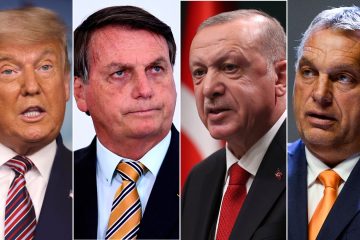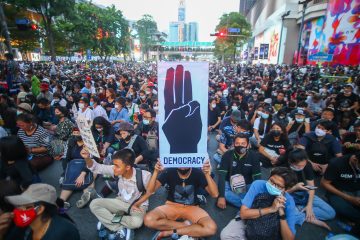
The Rise of the Radical Right in Italy and the Transformation of Italian Politics
Volatility Post-World War II Italian politics has often been marked by significant political instability and frequent changes of government. The twenty-first century period in Italian politics has been characterised by the emergence of new political forces, the decline of traditional parties, and persistent public policy challenges related to corruption, economic stagnation, and immigration (Albertazzi and Zulianello, 2021). Remarkably, Italy has had an astonishing 69 governments in 79 years. This means that on average, governments in Italy last for just over a year. Our forthcoming book “The Rise of the Radical Right in Italy: A New Balance of Power in the Right-Wing Camp” to be published by Columbia University Press and ibidem Press in June 2024 examines the more worrying trend …

OxPol Blogcast. Politics, Re-Imagined — Democratic Backsliding with Vicente Valentim
As we witness a rise in radical right politics in Europe and beyond, our host Cassandra van Douveren speaks to Dr. Vicente Valentim, a Postdoctoral Prize Research Fellow at Nuffield College at the University of Oxford. Vicente’s work focusses on the role of social norms in normalising the expression of views and behaviours associated with authoritarianism. Join us as we discuss his upcoming book, The Normalisation of the Radical Right: A Norms Theory of Political Supply and Demand (forthcoming: September 2024), pathways to restore democratic norms and Vicente’s hopes for the future. Politics, Re-Imagined is a series by the Department of Politics and International Relations (DPIR) at the University of Oxford focused on exploring tangible and sustainable solutions to the …

Populism and Crisis: Exploring the Interplay of Political Dynamics
Over the past two decades, the world has faced a series of crises including economic downturns, political disruptions exemplified by events such as the latest example of the Covid-19 pandemic, which have generated a discourse around a perceived crisis in democratic governance. Due to its perceived association with these crises, populism has become a focal point of both academic inquiry and broader societal discourse, with a strong emphasis on its relationship with democracy (Mény & Surel, 2002). Scholarly investigations into populism have expanded to encompass various dimensions, including its conceptual underpinnings and implications for democratic systems. The existing literature on populism underscores its delineation along two main axes: the assertion of popular sovereignty and the espousal of anti-establishment sentiments. Despite …

Identity Capital and the North-South Gap in Explaining Populism
The literature on populism in the 21st century often assumes that far-right leaders draw their support from voters who have lost out to globalisation. This is the case among low-skilled, white workers in Global North democracies, including the United States. But, there are also meaningful occurrences of backlash against the political establishment and liberal values in parts of the Global South that have clearly benefited from the post-Cold War trade openness. For instance, two of the largest democracies in the developing world have been shaken by right-wing movements that came to power with the support of the winners of economic liberalisation. In Brazil, Jair Bolsonaro, a former army captain, won the presidency in 2018 with the support of agribusiness exporters …

Tech, politics and publicness
I have had a laminated image pinned, stuck, or otherwise attached to various office walls for many years, since 2003 indeed, as I’ve moved between roles and institutions this has been one constant. The image is from the cover of Mute Magazine, Issue 26. It is a line drawing depicting a desk, on it a Macintosh PowerBook G4, Apple’s then state of the art portable computer – around it are drawn scenes from the global anti-capitalist struggles of the period. There is a picture of Sub-Commandant Marcos of the Mexican Zapatistas, in iconic balaclava, smoking a pipe and looking away into the mid-distance. There is another picture of workers in a field of GM crops, and one of a high-tech …

Covid-19 protests, YouTube, and the platform spectacle of populism
YouTube is a prime space for the communication of the hundreds, if not thousands, protests that have taken place around the world since mandatory measures were introduced by governments to contain the spread of the Covid-19 pandemic. From New York to Tokyo and from London to Sydney, protesting social distancing, face coverings, lockdowns and vaccines is caught up in hours of video footage by protesters themselves, passersby, and reporters, featuring as content for the YouTube channels of major international news agencies. According to a recent publication in Harvard’s Misinformation Review, such videos often serve as a backdrop for commentary out which emerge “participatory cultures of conspiracy theory knowledge production and circulation”. Here, I would like to shed light on a …

What is peripheral about Thai (democratic) politics?
The latest mass uprisings in Thailand have driven a wedge between people who remained complacent towards the status quo and people who sought to upend what they saw as conservative authoritarianism by resorting to rally politics. The latter wished to take matters into their own hands and steer the country in a more democratic direction as faith in mainstream political actors dwindled. Should marginalized civil-society actors not take drastic measures, future political trajectories will remain shrouded in conservative mist. A military coup in 2014 had enabled the conservative establishment to tighten its grip on the country’s politics. This is not a one-off incident but a recurring pattern in Thailand’s modern history. Via military coups, conservative forces have always found a …
Will Brazil’s Past be Mexico’s Future?
For the last two decades, observers and scholars of Latin American politics have wondered about the electoral fate of the left. Some analysts in particular have highlighted how the end of the ‘Pink-tide’ precipitated the comeback of right-of-centre governments across the region. But in this regard, Mexico has been running in dissonance to its regional counterparts. The right-of-centre parties Partido Acción Nacional (PAN) and then the Partido Revolucionario Institucional (PRI) occupied the executive office from 2000 to 2018 while most Latin American countries turned to either a radical or a reformist left. Now, however, left-of-centre Andres Manuel López Obrador (AMLO) and his National Regeneration Movement (MORENA) hold the Mexican presidency. To delineate what the future might hold for AMLO, we can look to the previous experience of the …









